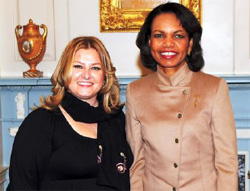Valdete Idrizi | |
|---|---|
 Valdete Idrizi (left) with Secretary Condoleezza Rice, 2008 | |
| Born | 27 June 1973 |
| Occupation | Engineer |
| Years active | 2000s–present |
| Known for | Women's rights activism |
| Political party | Democratic Party of Kosovo |
| Awards | 2008 International Women of Courage Award 2009 Soroptimist International Peace Award |
Valdete Idrizi (born 27 June 1973) [1] is the executive director of the CiviKos platform (in 2017). [2] She was the executive director of the NGO Community-Building Mitrovica, which she founded, and which works for peace and builds community in the Mitrovica region in northern Kosovo. [3] [4] For six years prior to 2008, Community-Building Mitrovica was the only organization in Mitrovica which encouraged reconciliation and rebuilding of relationships between ethnic Albanians and Serbs. [5] Idrizi herself is an ethnic Albanian from Kosovo in North Mitrovica who lost her home in 1999 when the Serbs invaded. [3] [5] [4] In 2008 her home was still occupied by Serbs. [3] Community-Building Mitrovica has managed to arrange the return of some Serbs to their homes in Kosovo, for which Idrizi received death threats from Kosovar Albanian militants. [3]
Idrizi received a 2008 International Women of Courage Award and the 2009 Soroptimist International Peace Award. [5] [6] [4]
She was chosen as CiviKos Platform Executive Director in December 2011; CiviKos is an initiative of civil society organizations in Kosovo "aimed at creating an enabling environment for [the] cooperation of [the] formal civil society sector and the Government." [2]